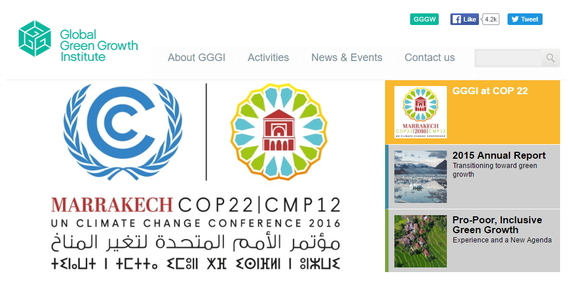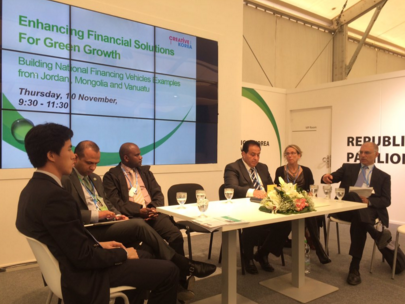That a global climate deal was struck in Paris late last year at UNFCCC COP21 was a big surprise to me. The agreement was not as strong as climate advocates would have liked, but any agreement that has essentially all governments agreeing that we should come together to limit climate change to well less than 2 degrees is a big step forward. That over 100 countries ratified the Paris Agreement at record speed, so that it came into effect last week, on November 4, was an even bigger surprise. And yesterday the U.S. elected Mr. Trump to become President in a stunning upset.
So, now the big question here in Marrakech at COP22 is: Can the Paris Agreement be implemented? Can individual governments agree on enough action to live up to their nationally determined commitments? Can all governments together agree on enough collective action to implement the commitment of $100 billion in climate finance per year? And can the positive momentum be sustained with a U.S. President who has stated that climate change is a hoax?
To implement the Paris Agreement, countries must shift their economies towards low-carbon and climate resilient development pathways - what we call "green growth". Supporting governments to do so is the business of the Global Green Growth Institute (GGGI). At COP22 here in Marrakech we are organizing three side-events with our partners to discuss how countries can deliver on their Paris Agreement commitments, and participate in many others.
A key challenge is, first, to make climate funding available, and second, to develop a strong pipeline of projects to deliver on the climate commitments - what we call "bankable projects". The Paris Agreement clearly outlines that all finance flows - both public and private - must be aligned with a low-carbon and climate-resilient future. At GGGI, we assist our member governments in accessing domestic and international climate finance by building National Financing Vehicles (NFVs) and a pipeline of bankable projects to deliver inclusive, pro-poor green growth, as well as climate action.
GGGI's first side event is aimed at sharing the organization's experience in supporting countries, ranging from Jordan, Ethiopia, Rwanda, Mongolia and the Philippines to Vanuatu to develop NFVs - which are in the start-up stages. In order to increase the flow of finance to developing countries, it is critical for institutions to have the ability to manage funds, establish effective governance systems, and develop a pipeline of well-prepared projects. While we begin to see climate finance become available through organizations like the Green Climate Fund, the bottleneck is the limited availability of high-quality, bankable projects that would indeed transform economies to the green growth development path. Overcoming that constraint is the key focus of GGGI's climate finance efforts.
All 190 countries have now set national climate targets as part of the Paris process. Through the Intended Nationally Determined Contributions (INDCs), countries have identified green growth as a major mechanism for delivering on the promises agreed on at last year's Paris climate conference. Their INDCs must now be turned into solid climate investment plans that promote green growth and innovative technologies to advance renewable energy and energy efficiency, and sustainable urban development.
GGGI supports partner governments in mainstreaming green growth and climate change actions into national and sub-national economic development plans and visions. GGGI has partnered for the development of the National Green Growth Plan in the context of, for example, Jordan's Vision 2025, the National Green Growth Plan as part of the UAE Vision 2021, and the Climate Resilient Green Economy (CRGE) for Ethiopia. All will be discussed at GGGI's side event on mainstreaming green growth into national strategies and plans.
Last, but not least, GGGI is assisting its member governments to bridge the financing gap by designing policies, advising on projects, and strengthening institutions within countries and among countries. We believe that collaborative projects and programs among countries on a regional basis can play an increasingly important role to implement the Paris Agreement. Therefore we are supporting collaborative partnerships among countries to speed up project and program financing and implementation.
GGGI's third side event will examine ways to bridge the financing gap and identify financial solutions for NDCs. Speakers and panelists at this event will discuss actions that need to be taken to close the financing gap between financial institutions and green growth projects in the Middle East, Africa, Latin America, and Asia. The event will serve as a platform to share knowledge, strengthen regional partnerships, and enhance the understanding of regional financial solutions for implementing NDCs.
We believe GGGI is well-positioned to support NDC implementation and help governments live up to their Paris Agreement commitments. To implement the Paris Agreement, and help the world limit global warming to less than 2 degrees, will require urgent action by all to transform economies towards a low-carbon, climate resilient development path - towards green growth. To achieve that will require all actors to come together, not least Mr. Trump. For now, I am with Hillary, who said: "we should give President Trump a chance to lead". Successfully implementing the Paris Agreement may well depend on it.
This post is part of a series produced by The Huffington Post, in conjunction with the U.N.'s 22nd Conference of the Parties (COP22) in Morocco (Nov. 7-18), aka the climate-change conference. The series will put a spotlight on climate-change issues and the conference itself. To view the entire series, visit here.






